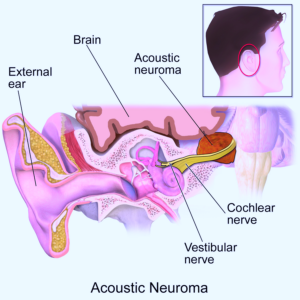Gamma Knife surgery is one of the treatment options for an acoustic neuroma, a type of brain tumor. But Gamma Knife surgery can have side effects.
If you’ve been diagnosed with an acoustic neuroma, you should be made aware that there are several treatment approaches.
These will depend on the location, size and shape of this benign tumor, and whether or not you have symptoms.
Sometimes these tumors are discovered by accident when the patient’s head undergoes imaging for an unrelated issue.
Other times they are found when an MRI is ordered to see what might be causing symptoms that the patient is having (e.g., hearing loss in one ear, tinnitus in one ear, clogged feeling in one ear, balance problems, dizziness, facial pain).
Gamma Knife surgery eliminates having to do any cutting into the skin and skull, or infiltration with instruments into the ear canal.
Gamma Knife Side Effects for Acoustic Neuroma Treatment
“The most common side effect from Gamma Knife (or any form of stereotactic radiosurgery) is hearing loss,” says Ted McRackan, MD, MSCR, Director, Skull Base Center; Assistant Professor, Department of Otolaryngology – Head and Neck Surgery, Medical University of South Carolina.
“Fewer than 30% of patients who receive Gamma Knife maintain serviceable hearing over the long term.”
This may seem bleak, but if your doctor has determined that gamma knife is the most effective route to go to deactivate the mass, then you must realize what could happen if the mass is not rendered inactive (or micro-surgically excised):
• Worsening hearing loss and other symptoms.
• This may include swallowing, speech and eye problems.
• Encroachment of the tumor upon the brainstem, which can disrupt electrical signals to the heart or cause fluid buildup in the brain.
Dr. McRackan adds, “Other side effects such as headache, weakness of the facial nerve, imbalance (due to treatment rather than from the acoustic neuroma) and visual problems are quite rare when Gamma Knife is performed for appropriate sized tumors.”
Permanent Hearing Loss a Reasonable Price to Pay
An acoustic neuroma is also called a vestibular Schwannoma. Gamma Knife treatment may be delivered as a single event or in multiple smaller events (fractionated stereotactic radiotherapy).
Gamma Knife works by stopping tumor growth, and in some cases it even shrinks over time.
Why would you want to undergo Gamma Knife surgery for acoustic neuroma treatment if a common side effect is permanent hearing loss? Some benefits:
• Facial and trigeminal nerve function can be preserved for most patients.
• No post-operative pain; no post-operative rehabilitation. Patients can immediately resume activities.
• No hair is shaved.
• Eliminates risk of infection, blood clots, hemorrhaging, brain swelling, prolonged (though temporary) facial weakness/paralysis and permanent facial weakness/paralysis.
• The cost is often 20% to 35% less than conventional neurosurgery.
The downside is as follows:
• Slight risk of tumor regrowth, requiring periodic MRI surveillance.
• Non-successful treatment usually means a micro-surgical removal rather than more Gamma Knife attempts.
• Very low to non-existent risk of malignant transformation triggered by the treatment.
• Good chance of permanent hearing loss.
Before you begin panicking that Gamma Knife for your acoustic neuroma will cause permanent hearing loss, you should know that micro-surgery as well can yield this side effect. It’s actually the most common complication.
 In addition to acoustic neuroma, Dr. McRackan’s clinical practice focuses on comprehensive management of ear, hearing, balance and skull base disorders. Areas of interest include cochlear implants, facial nerve disorders and tumors, vertigo and endoscopic ear surgery.
In addition to acoustic neuroma, Dr. McRackan’s clinical practice focuses on comprehensive management of ear, hearing, balance and skull base disorders. Areas of interest include cochlear implants, facial nerve disorders and tumors, vertigo and endoscopic ear surgery.
 Lorra Garrick has been covering medical, fitness and cybersecurity topics for many years, having written thousands of articles for print magazines and websites, including as a ghostwriter. She’s also a former ACE-certified personal trainer.
Lorra Garrick has been covering medical, fitness and cybersecurity topics for many years, having written thousands of articles for print magazines and websites, including as a ghostwriter. She’s also a former ACE-certified personal trainer.
.



























